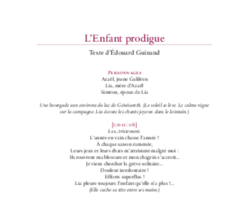L'Enfant prodigue
After winning second prize in the Prix de Rome competition for Le Gladiateur in 1883, Debussy was awarded the coveted first prize the following year, following the performance of his cantata L'Enfant prodigue on 27 June 1884, with twenty-two votes for and six against. The jury praised “a very definite sense of poetry, brilliant, warm colouring, lively, dramatic music.” He had acquired greater maturity since his first attempt, and it is likely that the subject suited him better. The absence of a long love duet in the piece excluded passionate outpourings and therefore required other resources. Édouard Guinand’s rendering of the biblical tale of the prodigal son, encouraged the exploration of an Eastern vein (according to Ernest Reyer, that was why his text was chosen). Taking care not to thwart the academicism of the Institut de France, Debussy employed conventional formulas (open fifths, modal colours, exotic arabesques for the woodwinds, rhythmic ostinatos, a pompous final chorale) and retained a lush lyricism influenced by Massenet (a sign of modernity at that time). But he also introduced more personal touches, noticeable in particular in the fluidity of the rhythms, the quick changes in the timbral combinations, and the unpredictability of certain harmonic progressions which deviate from the established rules. Later he questioned the relevance of the Prix de Rome, describing it as “a game, or rather a national sport” (1903). That did not prevent him from re-orchestrating L'Enfant prodigue in 1908 with the help of André Caplet, and having the score published by Durand, which shows that he must have found some quality in his early composition.


